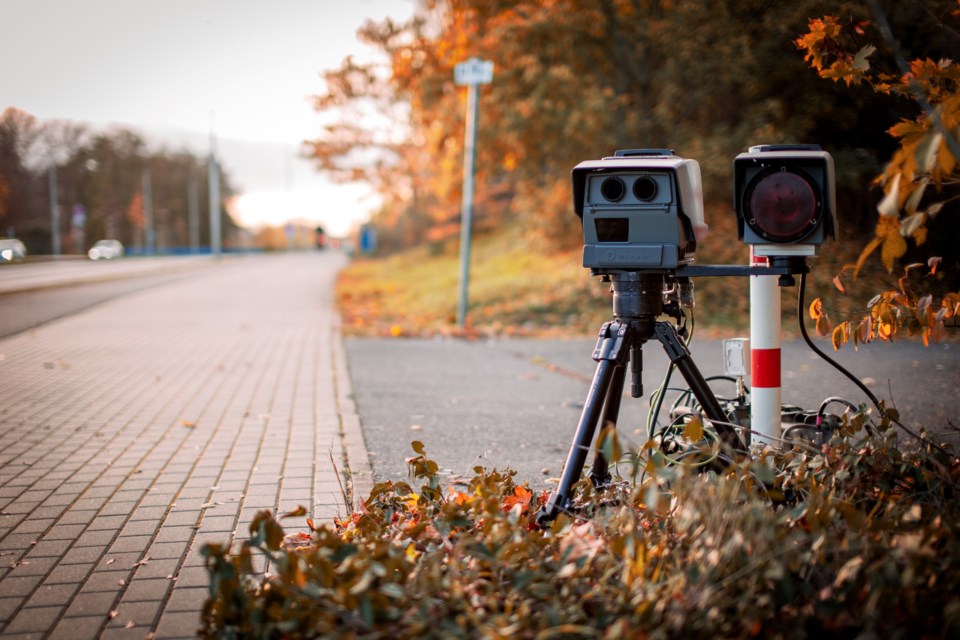Town council has slowed a controversial plan to drop the town’s default speed limit to 40 km/h.
But speeders beware: 14 mobile photo radar cameras will arrive on Oakville streets next summer.
“There’s no question that we have a speeding issue,” said Ward 2 councillor Cathy Duddeck. “The problem I have is answering questions that I’ve received as to the data we have that qualifies for a town-wide blanket reduction to the speed limit.”
Last January, councillors voted to cut the speed limit to 40 km/h on all but Oakville’s largest streets.
But they did it immediately after receiving a staff report that found a year-long 40 km/h pilot project in West River was ineffective at lowering driving speeds.
When a staff plan for implementing the new lower speed limits arose for debate on Oct. 18, Duddeck convinced councillors that more study was necessary.
The town will now gather a full year of non-pandemic data from West River and Heritage Way pilot projects to determine the impact of reduced speed limits and consider issues such as signage.
An additional pilot will be launched in Bronte’s Lakeshore Woods neighbourhood, on the initiative of Ward 1 councillor Beth Robertson.
Several councillors expressed skepticism that lowered speed limits would slow drivers, particularly without any additional enforcement.
“Simply making a rule doesn’t do anything unless you enforce it,” noted Ward 5 councillor Jeff Knoll.
“And until we have the means to enforce it, all we’re doing is creating a panacea on the part of the community to believe we’ve done something to make them automatically safer. And I just don’t believe that’s the case.”
The enforcement answer, many councillors believe, will come in the form of photo radar speed cameras – officially known as automated speed enforcement.
‘Hit them in the pocketbook.’
Beginning next summer, the town will use mobile cameras to ticket speeders in areas designated as community safety zones (CSZ).
Near schools or in other safety-sensitive areas, the town’s 30 or so CZSs are areas where higher speed scrutiny is deemed necessary.
Tickets will be issued to the plate holder of the vehicle, regardless of who is driving at the time of the offence. The penalty will be a monetary fine but no demerit points.
Town staff had recommended Oakville lease seven mobile cameras, with one rotating through the CSZs in each ward.
Council agreed that wasn’t enough and unanimously agreed to purchase and operate 14 cameras in 2022, at a net annual cost of $449,506.
“To me, you’ve got to hit the pocketbook to get people to understand,” said Ward 4 councillor Allan Elgar. “We need a system that is going to work.”
Provincial rules govern how communities can introduce automated speed enforcement.
Municipalities are required to purchase cameras from Redflex, the province's only approved equipment vendor. The company will also charge the town $95 per camera per day to operate the devices, plus an additional fee to manage requests for camera relocation.
Oakville must also participate in a joint processing centre managed by the City of Toronto, which will process all camera images generated across the province.
The provincial Ministry of Transportation will charge the town to access license plate information, while the town will also pay a fee to Halton court services to manage the ticket system.
Martin Maguire, the town’s manager of transportation services, said the system would also cap Oakville at issuing 5,000 tickets per year – or about $360,000 in revenue.
As a result, he told councillors that cameras might only operate two to three hours per day.
“But the good news is that motorists don’t know if the camera is operational or not, and studies done outside of the operational hours show that just the presence of the camera has had a positive impact on operating speeds,” he said.
